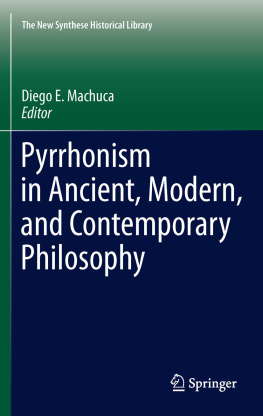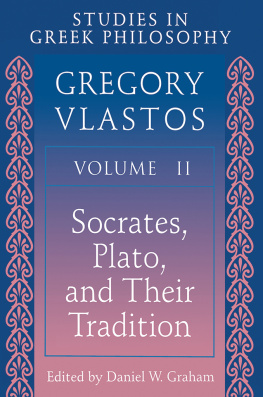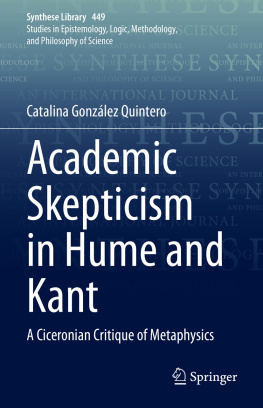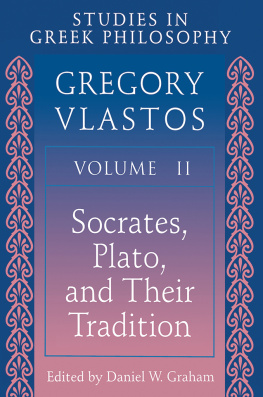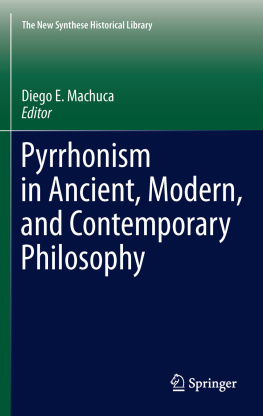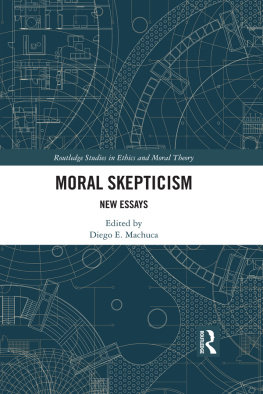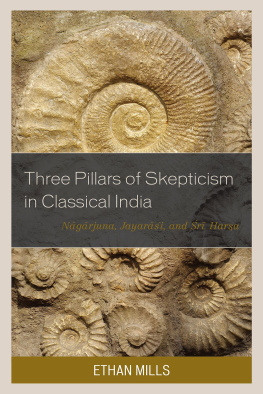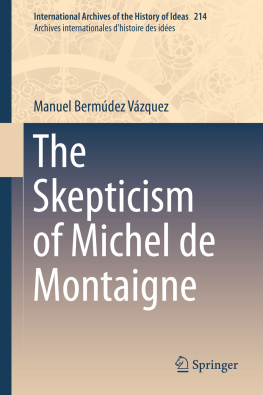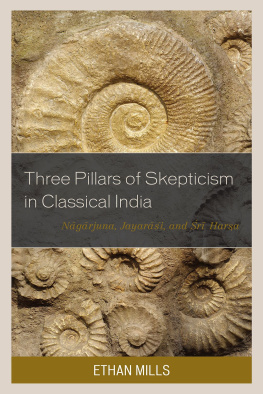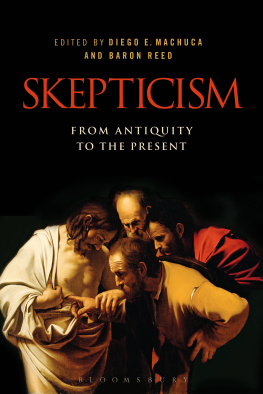Diego E. Machuca (ed.) The New Synthese Historical Library Pyrrhonism in Ancient, Modern, and Contemporary Philosophy 10.1007/978-94-007-1991-0_1 Springer Science+Business Media B.V. 2012
1. How Ethical Can an Ancient Skeptic Be?
Abstract
The paper addresses the question whether a Pyrrhonist skeptic has the resources with which to live a life that the rest of us would consider ethically robust, focusing especially on the writings of Sextus Empiricus. In the area of ethics, the Pyrrhonist refrains from positing anything that is good or bad by nature. This is a belief that he takes ordinary people, and not just philosophers, to hold. Although Sextus says that the skeptics ataraxia , freedom from worry, comes from suspension of judgment on all topics, his account of how ataraxia is generated focuses exclusively on the turmoil that afflicts those who do believe in things good or bad by nature. His argument that such beliefs are a source of trouble seems more convincing in some cases than in others. As for the skeptics own actions, Sextus says that they are shaped by the way things appear; in the case of ethics, the most important such appearances are the laws and customs of the society in which one was raised. Now, to follow laws and customs with no convictions as to their rightness or wrongness seems a strikingly passive approach to life. It seems to eliminate any notion of values in which one is invested as a self; and it seems to encourage an unattractive degree of conformism. In other words, it does not seem to permit an ethically robust life. It is suggested that, contrary to Sextus own presentation of the matter, the crucial point is not the absence of any belief in things good and bad by nature. What is central is the absence of any thought that certain things really matter or are really important (a thought that is not necessarily dependent on any belief in ethical objectivity). At the root, then, of the skeptics ethically impoverished attitude (as most of us would think of it) is the commitment to ataraxia or tranquility.
It is a commonplace that ancient skepticism differs from skepticism as discussed in contemporary philosophy or at any rate, in contemporary epistemology in being practical; but it is clear that this is a major point of contention in the study of the ancient skeptical outlook.
My concern, however, is with an aspect of the other claim confined, as I say, to the Pyrrhonist tradition of skepticism namely, that the skeptic is better off than other people. Supposing we grant that the skeptical life, as the Pyrrhonist depicts it, is indeed possible, is it a life that we could reasonably welcome or aspire to? More specifically, I have in mind the question what kind of values the skeptical life can include and what kind of adherence to these values it can permit. Does the skeptic and again, from now on by skeptic I mean Pyrrhonist skeptic have the resources with which to live a life that the rest of us would consider ethically robust? I shall argue that there is room for considerable doubt about this. And, to the extent that this is so, many of us will find it difficult to accept that this life is as desirable as the skeptic tries to make it sound. Tackling these issues requires us to be clear about a number of points concerning the nature of the Pyrrhonist outlook particularly, but not only, in ethics and this is where I begin. For the rest of the paper, I focus on Pyrrhonism as represented by Sextus Empiricus, who stands near the end of the tradition and is the only Pyrrhonist of whom complete works survive.
Sextus describes skepticism as an ability to produce oppositions, among arguments or impressions on the same topic, in such a way as to produce suspension of judgment because of the equal strength ( isostheneia ) of the items opposed to one another ( Outlines of Pyrrhonism [ PH ] 1.8). Faced with these opposing arguments and impressions, one cannot muster any inclination to accept any one of them in preference to the others; hence one has no choice but to withhold ones acceptance from all of them. This is not to say that one thinks any or all of them are false or misleading; one does not think anything definite about them at all one simply refrains from having any view, one way or the other, about their correctness. Nor is this because one thinks suspension of judgment is the rationally required response to the situation. For that would itself amount to the holding of a definite view on the meta-level, about the nature of rational justification; but the topics on which the skeptic aims to produce suspension of judgment are quite unrestricted, and so would include second-order logical or epistemological topics like this. Rather, ones suspension of judgment must be understood as the inevitable psychological reaction to being faced with oppositions that the skeptic has set up so as to be of equal strength. That we that is, both the skeptics themselves and others confronted with their approach experience this reaction in these circumstances is no doubt due to deep-seated features of our psychological make-up. Sextus does not deny this; one of his central explanations for our thinking and acting as we do is our natural perceptual and cognitive capacities ( PH 1.234). He does not, however, attempt to theorize about these capacities, which would again be inconsistent with a skeptical outlook. If pressed to explain why we suspend judgment when placed in the position engineered by the skeptic as opposed, say, to accepting both poles of a contradiction his answer would simply be thats the way we are. That there are characteristics with which we are born, and others inculcated through our experience, that shape the way we behave is a theme we will return to later. The important point to note for now is the intellectual passivity (as Sextus himself depicts the situation) of even the central move in the adoption of skepticism itself, the move to suspension of judgment.
In the area of ethics, Sextus discussion mainly revolves around one central topic: is anything in reality or, as he often puts it, by nature ( phusei ) good or bad?; it may be that the picture sketched above which is based on the only explicit treatment of the general principles of skepticism in Sextus surviving work, and seems to conform to his actual practice most of the time represents just one version or phase of the Pyrrhonist outlook, not the only one. But we need not worry about these questions here. For what the two works have in common is the idea that the skeptic refrains from positing anything that is good or bad by nature; and, as we shall see, it is this that is crucial for understanding the Pyrrhonists own practical attitudes.
I said that the skeptics suspension of judgment is unrestricted as to subject-matter. But this needs to be qualified. What Sextus says is that the skeptic suspends judgment about how things are, but does not question the fact that things appear to us in certain ways ( PH 1.1920). Honey appears to us sweet (most of the time, anyway), and that it appears so is not up for discussion; what is subject to debate, and what the skeptic will eventually suspend judgment about, is whether it actually is sweet. And, with this proviso that we are dealing with how things are, not with how they appear the claim that skeptical suspension of judgment is unrestricted can stand. Now, there is a difficult question about how we are to understand this division; what exactly is supposed to fall on the side of how things are, and what on the other side? Sextus is clear that theoretical questions of the kind investigated by the sciences are questions about which the skeptic does suspend judgment ( PH 1.13). And it is possible to understand the honey example as falling under this heading; perhaps what Sextus suspends judgment about are questions such as honeys underlying molecular structure. But a great many everyday beliefs are not like this. Take my belief that I am now on the twelfth floor of an apartment building that is currently serving as the temporary headquarters for the humanities departments at Johns Hopkins, while their regular building is undergoing major renovations as I can see from its scaffolding-covered exterior, which features prominently in the spectacular view that is my temporary offices one advantage over my normal workspace. Sextus gives no explicit answer as to how to classify a belief, or set of beliefs, such as this. It is, in any normal sense, about how things are, not how they appear; yet its subject or subjects are clearly not theoretical or scientific in character. Scholars have debated this point of interpretation without any clear resolution, and it may be that Sextus text offers no single, clear and consistent answer on the question.

